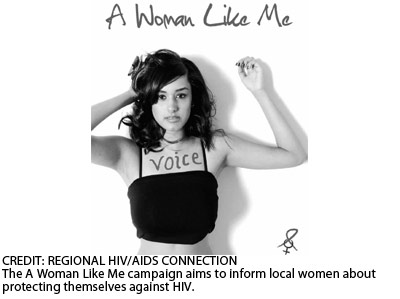A woman like you

HIV is not something you want to think about when you're getting ready for some fun with a partner, but it's something women need to be aware of, as they're becoming increasingly at risk for contracting it.
A new local campaign, called A Woman Like Me, aims to open women's eyes about their risks of contracting HIV. It began on March 8, to coincide with International Women's Day. It is being put together in partnership by the Regional HIV/AIDS Connection and the Options Clinic service of the London InterCommunity Health Centre.
"There's a notable increase in women contracting HIV. This has been going on since 2000," explained Bonnie Baynham, women's HIV/AIDS community development coordinator for the Regional HIV/AIDS Connection and organizer of the campaign.
"There are some theories around why women are more susceptible to contracting HIV, one being our bodies," said Baynham. "There's more area in our vaginas, for example, for the virus to get in. If there are any cuts or scrapes, or maybe an existing STI. Women actually contract it easier than men do."
Internationally, women between the ages of 15 and 24 are 1.6 times more likely to be infected with HIV/AIDS than their male peers.
Despite the fact that more women are contracting the virus, they are still not being tested.
"In 2010, the Options clinic tested 871 people (for HIV)," explained Lyn Pierre Pitman, coordinator of the clinic. "Of those 871 people, only 23 per cent were women."
"Younger folks under the age of 19 aren't really being tested," she continued. The majority of people who were tested last year were aged 20 to 29, representing 38 per cent of those tested. The under-19 age group only represented four per cent.
"About 30 per cent of people who have HIV don't even know they do ... because they're not being tested," said Baynham.
A Woman Like Me aims to empower women of all ages with knowledge and increase their awareness about the importance of being tested.
"It is really built on women taking charge of their sexual health and taking care of their health in general," explained Baynham.
"We need to empower each other," added Pierre Pitman. "If the guy doesn't want to wear a condom, women need to be able to speak up and say, 'This is my body. You may not want to, but you need to, because I need to keep myself safe.'"
Part of the campaign includes educating women about testing and what the process involves.
The Options clinic is the only one in London that offers a rapid test. It is free and completely anonymous ... no identifying information is required. "Anonymous testing means that nothing is reported about the client. Even if the client were to test positive, that information would stay with us," added Pierre Pitman.
An appointment to be tested at the clinic involves counseling before and after the test. Pre-test counseling involves a risk assessment, where the counselor will help you explore your lifestyle to see how at-risk you are for HIV. This can include talking about sexual history, needle use and accidental workplace exposure, and the counselor will address the ways of doing things safely and outline the basics of how HIV is transmitted. "We'll talk about condoms or the needle exchange program, safe tattooing and piercing, things like that," Pierre Pitman said. The counselor will also discuss steps that will be taken in the event that the test shows positive for HIV.
The test itself doesn't take long. Baynham said it was comparable to a diabetic blood sugar test — a simple finger prick to draw some blood. The blood is then examined for the presence of antibodies created by the body when it is infected with HIV. The test can tell if the antibodies are there, but not the concentration, meaning that this test cannot determine how long a person has had the virus.
"Fortunately, most people do test negative," said Pierre Pitman. "The odds are 99 to one that someone will test HIV negative."
In the event a person tests positive for HIV, Bayham said the clinic will perform a second blood test to make 100 per cent sure.
The next step, according to Pierre Pitman, is to give the person a copy of their test results to take to their family doctor, who will refer them to the infectious disease program at St. Joseph's hospital. They will then perform a viral load test, to determine how far the virus has progressed, and decide on medication and treatment from there.
The campaign aims to inform women about the resources in the community that are available to them to learn more about HIV/AIDS or for support should they test positive.
"It's not about the scare tactics, but more about information. I think with the information, people can be better informed about what their risks are," Baynham said. "This campaign, A Woman Like Me, is really about that — ensuring information gets out, and that women feel empowered with that information to take the precautions they need to stay safe."
For more information about the Regional HIV/AIDS Connection, visit aidslondon.com. For information about the Options Clinic and the London InterCommunity Health Centre, visit lihc.on.ca.













